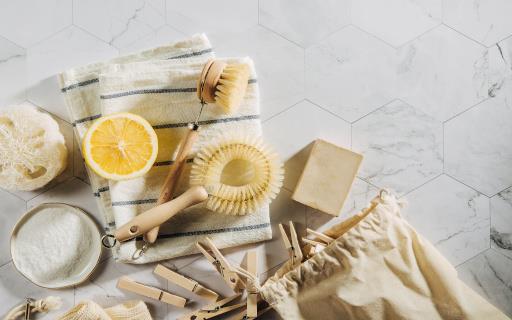Cleaning Hacks while Turning Over a Rental Property

When it comes time to clean your rental property and get it ready for the next tenant, you may find yourself wondering where to start. Cleaning your own home can be a daunting task, especially if you don’t have a set cleaning schedule. But properly deep cleaning your rental properly on a time crunch to get it ready for the next tenant can be even more of a challenge. With the right materials and supplies and a clear outline, however, cleaning your rental property in a fast, efficient, and thorough manner can be easy.
Cleaning Checklist By Room
Making your cleaning job easy starts with getting prepared. You don’t want to get underway and realize the few cloths and cleaners you have are woefully underprepared for the job ahead. Use the following list and head to your local supermarket or hardware store and start stocking up so that when it comes time for a deep clean, you’ll be ready to go.
- Baking soda.
- Broom.
- Brush with stiff bristles.
- Cleaning caddy (optional, but helpful).
- Dish soap.
- Dusting cloths (microfiber works best).
- Garden hose (for yard work).
- Gloves to protect your hands
- Mineral oil.
- Mop.
- Multi-purpose cleaner.
- Sponges.
- Telescoping pole for high and hard-to-reach spaces.
- Vacuum cleaner with extension accessories.
- White vinegar.
- Window and glass cleaner.
- Wood cleaner and/or polish.
How to Clean Your Kitchen
The kitchen is probably the home’s hotspot for messes, especially if you had multiple tenants living in the unit. The stovetop, refrigerator, countertops, and sink see a lot of action and abuse over the course of a lease, so if they’re all in need of a deep clean you’ll need an action plan to make every surface shine.
The stove/oven
- Use the self-clean feature on your oven if available.
- Use a combination of baking soda, dish soap and vinegar to tackle tough messes.
- Scrub and wipe clean.
- Don’t forget to clean the burner grates if you have a gas stove.
- Cleaning polishes like Pink Stuff can remove stains on glass cooktops.
Pro Tip: Soak your oven racks in the sink or bathtub and pour vinegar on top of them.
The refrigerator
- Defrost the freezer.
- Remove any old food.
- Wipe out stains or any other messes (inside and outside).
- Remove dirt/dust from coil and vents.
- Remove/replace any water filters.
Pro tip: Use a vacuum to suck up dirt and dust from refrigerator coil and vents
The dishwasher
- Replace and/ or clean filters.
- Run dishwasher on hot with one to two cups of white vinegar.
- Run another hot cycle with a half cup of baking soda.
- Wipe down and disinfect the exterior.
Pro tip: mixture of dish soap, water, and white vinegar makes a great homemade cleaner that’s safe for all dishwasher surfaces.
The sink (and dishes)
- Scrub the sink.
- Wash and or place dirty dishes in the dishwasher.
- Disinfect the sink.
- Wipe down countertops and small appliances.
- Disinfect coffee pots, microwaves, toasters.
- Mineral oil helps remove greasy dust.
Pro Tip: You can remove tough stains on a laminate countertop with nail polish remover, and Bar Keeper’s Friend can help clean porcelain sinks.
How to Clean Your Bathrooms
After the kitchen, the bathroom is likely to be the next problem area that is need of a deep clean before your next tenant starts moving in. Take extra care to ensure the bathroom is in tip-top shape as it can go a long way to making the entire rental feel clean as a whistle.
The shower and bathtubs
- Empty the shower of leftover products (shampoo/soaps/razors etc).
- Scrub the shower, floor, walls and bathtubs.
- Replace shower curtains or run them through the washing machine if applicable
- Clean shower grout with a small scrub brush to remove discoloration
- Baking soda and white vinegar is a safe alternative for removing hair buildup in drains
Pro Tip: A combination of lemon juice and baking soda can remove rust stains left by shaving cream or razors.
Mirrors and light fixtures
- Remove debris or stray hair with a clean cloth.
- Spray mirror with glass cleaner and use a microfiber cloth for a streak-free finish.
- Clean light fixtures with soapy water and disinfectant.
- Check vent fans for dust buildup to ensure proper ventilation
- Look for mold on walls and clean any minor instances with a bleach/water solution
Pro Tip: avoid foggy bathroom mirrors by wiping it down with a combo of vinegar, dish soap and a spray bottle.
Sinks, faucets and handles
- Different cleaning can be required by sink materials (porcelain vs stainless steel).
- Scrub/wipe/disinfect sink basin
- Any partial/clogged drains can be cleared with baking soda and white vinegar
- Use soapy water and a sponge to scrub/wipe down faucets and handles.
Pro Tip: Consider using a lemon to remove tough rust stains.
Toilets
- Use a toilet brush to remove any stains.
- Use a dedicated toilet bowl cleaner or consider a stick-on bowl cleaner that cleanses after every flush.
- Use a clean cloth and disinfectant to wipe down the exterior.
Pro Tip: Make sure you disinfect both your toilet brush and holder when you're done cleaning.
How To Clean Your Rooms
When it comes to bedrooms, the living room, dining rooms, or any space outside of the kitchen and bathroom(s), you may need to take a specialized approach depending on the size of the room, use, type of flooring, and more. Here’s a basic routine for deep cleaning any room without specific features or appliances like the kitchen or laundry room.
Vacuum carpet or clean non-carpeted areas
- Remove any debris and/or move items away from carpet.
- Go over the main carpeted area with your vacuum cleaner.
- Use a vacuum or duster extension to get hard to reach areas.
- Non carpeted areas can be cleaned with a mop and bucket plus your favorite cleaning solution (vacuum first).
- Deodorize carpets by sprinkling baking soda over the area, letting it sit, and then vacuuming.
Pro Tip: Consider utilizing your dishwasher to effectively clean your vacuum.
Dust curtain and light fixtures
- Check curtain tags to understand any required cleaning “dry clean only” etc.
- Add curtains to the washer.
- Dust and disinfect light fixtures.
Pro Tip: Consider ironing, pressing, or steaming your curtains to make them look brand new.
Clean windows
- Rinse the outside of windows with a hose.
- Scrub both inside and outside of window with a sponge.
- Rinse windows with clean water.
- Use a squeegee and towel to avoid streaking.
Pro Tip: don’t forget the window screens which can be cleaned with a vinegar and water solution.
How to Clean Your Laundry Room
For as much dirt as your rental’s laundry room sees every day, it’s probably in need of a good deep clean. Most people know how to clean their oven or even their dishwasher, but your washer and dryer also require periodic cleanings to remove product build up and to ensure they clean your clothes and linens properly.
Clean your washer and dryer
- Clean rubber gaskets and door seals, more common in front loaders
- If your machine has a detergent dispenser, add 1 or 2 cups of white vinegar and run a hot cycle
- Sanitize the drum by running another hot cycle with 1/3 cup of baking soda added to the drum
- For top loaders, run a hot cycle, let the machine fill, and add 2 to 3 cups of white vinegar
- Vacuum out your lint trap and consider having your dryer vent cleaned by a professional
Pro Tip: Clean your agitator (if your machine has one) with hot water and vinegar to remove buildup.
Clean the rest of your laundry space
- Mop the floor
- Dust surfaces and light fixtures
- Vacuum between and around the washer and dryer, pull them out from the wall if need be
Having a clean rental property is a crucial part of appealing to potential renters. If a possible tenant comes to tour the space, or worse, shows up to start moving in their belongings and they find a dirty rental that shows signs of neglect, you’re not setting yourself up to have them renew. By staying prepared and having all the requisite cleaning supplies and knowing how to tackle each room in your rental you’ll provide a cleaner and healthier living space for your renters and make a better impression as a property owner.
Share this post




